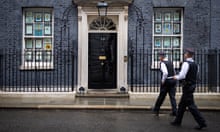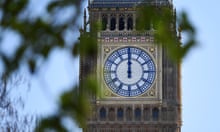A year ago today the Labour party in Batley and Spen selected me to be its candidate in the byelection for my sister Jo Cox’s former constituency. Whether or not to stand was one of the hardest decisions I have ever made. There was a lot of discussion with my family and those closest to me. My sister had been murdered so we had to ask ourselves the question – would I be safe?
I decided to run because I wanted the best for the people who I live near, shop alongside, play sports with and whom I’ve worked with since Jo’s death to keep our community strong and united. I would never have asked for their trust at the ballot box if I thought that winning would cut me off behind a wall of security. Since I won I’ve managed to stay accessible while taking all the advice the police and parliamentary security team have offered me.
When another MP, Sir David Amess, was murdered last October, Channel 4’s Dispatches asked me to talk to my colleagues on all sides of the House of Commons to discover just how serious the threats to them – and to the fabric of our democracy itself – really are. What I learned was shocking. Not just because of the nature of abuse and threats MPs receive every day, which can be truly appalling, but the sheer scale of them.
I listened as colleagues reeled off the threats of death, violence, sexual assault and attacks on their families as if they were reading their shopping lists. Dispatches spoke to more than 60 MPs for the programme, and nearly all said they had received abusive or threatening messages, three-quarters said they had received a threat of physical harm and one in three of the female MPs said they had been threatened with sexual violence.
We cannot, we must not, normalise this. It doesn’t just “go with the job”. I know that it has already driven some really good MPs – most of them women – to leave public life altogether. And we can never know how many talented young people are now being put off politics as a career.
This is not just about those elected to parliament. Nobody is suggesting that MPs are alone in being subjected to this avalanche of hatred and intimidation. I worry desperately about the staff in our offices, many of them young, who have to read the emails and letters and who so often shield their bosses from the contents of them. They get no training in how to identify a genuine and dangerous threat from the keyboard warriors who get a kick out of threatening violence that they’ll probably never carry out. Our parliamentary and constituency workers get no extra pay for handling this filth and it’s down to individual MPs to make sure they are offered support and, if necessary, counselling.
Since Sir David’s murder there are important steps under way behind the scenes to address some of these problems. It saddens me, after all the promising conversations that followed my sister’s murder, that we have waited this long, but nevertheless I welcome it wholeheartedly.
Like people in every walk of life, those of us in politics have to work in the world as we find it, communicating both online and in person. But that doesn’t mean we have to shrug our shoulders and accept that world as it is. After all, we are elected to parliament to change things for the better and to help protect all our citizens from harm. The online safety bill should bring important changes. But if we want to defend our democratic values and encourage vigorous, passionate debate that is free of abuse and intimidation, we cannot do it by tighter security measures and legislation alone.
As MPs, we need to look at our own behaviour, the language we use and the example we set. We need to be better at explaining what we do and encourage a greater understanding of how politics works and why it matters – in schools and in the community more widely.
Proper support and protection for MPs is not just about our own personal safety. Our democracy may be well-established but it is not invulnerable. Just as we defend democratic values abroad when they are threatened, we must defend them at home as well. It has to be a collective effort in which everybody has a part to play. And the evidence we have gathered for tonight’s programme makes clear that we can’t put it off any longer.
Kim Leadbeater is the Labour MP for Batley and Spen. Dispatches: MPs Under Threat airs at 7.30pm on Monday 23 May on Channel 4
Do you have an opinion on the issues raised in this article? If you would like to submit a letter of up to 300 words to be considered for publication, email it to us at guardian.letters@theguardian.com








